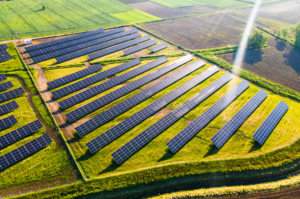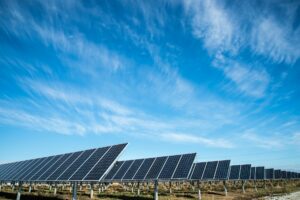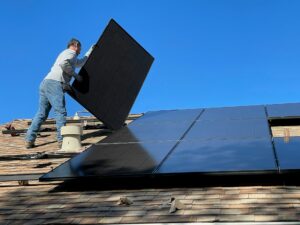Alberta 
Indigenous Joint Venture Closes in on Completing 23.6-MW Alberta Solar Farm
 An Indigenous joint venture is just weeks away from cutting the ribbon on a C$52-million, 23.6-megawatt solar farm in southeastern Alberta that will generate enough electricity to power 20,000 average homes per year. The Tilley Solar project is a combined effort of the Alexander Business Centre, based in Morinville north of Edmonton, and British Columbia-based First Nation Power Development, which connects Indigenous communities with renewable energy projects. When funding was announced in April 2024, the CIB said the project would consist of 69,450 fixed-tilt photovoltaic panels, create up to 150 full-time jobs during construction, and reduce climate pollution by 14,200 tonnes per year once it goes into operation this spring. Tilley Solar was approved before the Alberta government slapped a seven-month moratorium on renewable energy development in August 2023. Before the provincial moratorium and subsequent interventions, Alberta accounted for about 92% of the growth in Canadian renewable energy markets. Source: The Energy Mix
An Indigenous joint venture is just weeks away from cutting the ribbon on a C$52-million, 23.6-megawatt solar farm in southeastern Alberta that will generate enough electricity to power 20,000 average homes per year. The Tilley Solar project is a combined effort of the Alexander Business Centre, based in Morinville north of Edmonton, and British Columbia-based First Nation Power Development, which connects Indigenous communities with renewable energy projects. When funding was announced in April 2024, the CIB said the project would consist of 69,450 fixed-tilt photovoltaic panels, create up to 150 full-time jobs during construction, and reduce climate pollution by 14,200 tonnes per year once it goes into operation this spring. Tilley Solar was approved before the Alberta government slapped a seven-month moratorium on renewable energy development in August 2023. Before the provincial moratorium and subsequent interventions, Alberta accounted for about 92% of the growth in Canadian renewable energy markets. Source: The Energy Mix
Electricity Prices for Alberta
The Alberta power pool price averaged 3.474 cents per kWh in March 2025. This price is 2.103 cents lower than last month’s average of 5.577 cents. The pool price has averaged 4.814 cents per kWh over the last 12 months.
As of April 1, 2025, the forward market was predicting electricity prices for the calendar years of 2025, 2026, 2027, 2028, 2029, 2030, and 2031. These prices are 4.136, 4.529, 4.950, 5.550, 5.900, 5.900, and 5.900 cents per kWh respectively.
Gas Prices for Alberta
Direct Energy’s gas rate for March 2025 was $2.446 per GJ in Alberta. The April 2025 rate has been set at $2.210 per GJ. Alberta gas prices have averaged $1.561 per GJ over the last 12 months.
As of April 1, 2025, the forward market was predicting gas prices for the calendar years of 2025, 2026, 2027, 2028, and 2029. These prices are 2.59, 3.16, 3.05, 2.96, and 2.93 cents per GJ respectively.
British Columbia 
First Nations expand development in B.C. clean-energy sector
Twelve First Nations throughout British Columbia are receiving provincial funding to support clean-energy projects that will help their members lower energy costs and provide them access to efficient, sustainable sources of energy. The First Nations Clean Energy Business Fund is providing 12 First Nations approximately $1.49 million in capacity and equity funding to develop clean-energy projects that will help provide energy options that are affordable, reduce emissions, protect the environment and bolster local economies. Projects range from installing 24 residential solar photovoltaic systems on Cayoose Creek homes to developing a comprehensive community energy plan for the Nazko First Nation.
The Yekooche First Nation will explore clean-energy opportunities in its territory, where frequent climate-related hazards, such as wildfires and severe storms, have started to impact the local electricity supply. The B.C. government is providing $50,000 to help the Nation complete a prefeasibility study that will assess the viability of solar and wind power projects. The First Nations Clean Energy Business Fund also supports projects that align with the Province’s CleanBC plan, including: community energy plans and clean-energy feasibility studies; energy efficiency projects such as heat-pump installations and improving insulation in homes; and clean-energy generation projects. Source: Environment Journal
Ontario 
Ontario Doubling Hydrogen Innovation Fund to $30 Million to Protect Ontario Jobs
The Ontario government is launching a new round of the Hydrogen Innovation Fund, investing $30 million to unlock hydrogen’s potential to drive economic growth, create jobs and support the province’s position as a leader in the clean energy economy. The Hydrogen Innovation Fund will kickstart and develop opportunities for hydrogen to play a bigger role in Ontario’s integrated energy system. The Hydrogen Innovation Fund will do this by supporting projects across two streams: projects with direct electricity system benefits, and projects enabling broader energy and other sector applications. Natural Resources Canada modelling shows that hydrogen could make up as much as 18 per cent of the country’s energy use by 2050 and create up to 135,000 jobs across Canada. By investing early in Ontario’s hydrogen sector, the government is setting the stage for long-term economic growth, creating good-paying jobs today and securing Ontario’s prosperity for tomorrow. Source: Ontario
Saskatchewan 
La Plonge Solar and Battery Energy Storage System Project Under Construction in Northern Saskatchewan
 As First Nations spearhead sustainable and clean energy initiatives across Canada, the Des Nedhe Group, the 100% owned development arm of English River First Nation, and Extropic Energy, are proud to announce the development of the La Plonge Solar and Battery Energy Storage System through their collaborative clean energy service provider, Aurora Renewables. The La Plonge Solar and Battery Energy Storage System, located on reserve in northern Saskatchewan, will generate clean energy at the existing remote distribution system supplying power to English River First Nation. Northern and remote communities, such as La Plonge, have and continue to face significant challenges to reliable power. This project is a first step of many renewable energy initiatives projected to be developed by Aurora Renewables. It further marks a pivotal moment in the journey towards Indigenous-led clean energy solutions in northern Saskatchewan. Source: Des Nedhe Group
As First Nations spearhead sustainable and clean energy initiatives across Canada, the Des Nedhe Group, the 100% owned development arm of English River First Nation, and Extropic Energy, are proud to announce the development of the La Plonge Solar and Battery Energy Storage System through their collaborative clean energy service provider, Aurora Renewables. The La Plonge Solar and Battery Energy Storage System, located on reserve in northern Saskatchewan, will generate clean energy at the existing remote distribution system supplying power to English River First Nation. Northern and remote communities, such as La Plonge, have and continue to face significant challenges to reliable power. This project is a first step of many renewable energy initiatives projected to be developed by Aurora Renewables. It further marks a pivotal moment in the journey towards Indigenous-led clean energy solutions in northern Saskatchewan. Source: Des Nedhe Group
Manitoba 
Canada and Manitoba Invest in Helping Homeowners Install Energy-Efficient Home Heating Systems
Manitobans have a natural choice for cleaner, more affordable home heating: energy-efficient heat pumps. By replacing oil-based heating, heat pumps provide reliable warmth in winter and cooling in summer while lowering home energy costs — all while cutting pollution. Jonathan Wilkinson, Minister of Energy and Natural Resources and Mike Moyes, Manitoba Environment and Climate Change Minister, announced a federal investment of approximately $7.9 million toward the Oil to Heat Pump Affordability program (OHPA) to support climate action in Manitoba and help low- to median-income homeowners reduce their energy bills. Eligible homeowners can receive an up-front payment of up to $20,000 toward the purchase and installation of a high-efficiency heat pump in homes currently heated with oil, plus a one-time $250 heat pump bonus payment to further help participants with the costs associated to transition from oil heating. Source: Government of Canada
New Brunswick 
The largest battery energy storage system in New Brunswick is launched
Recently, representatives from Neqotkuk (also known as Tobique First Nation), Saint John Energy, and Natural Forces joined together for the inauguration of a large battery energy storage system, which is part of the Burchill Wind Project in Saint John, New Brunswick. The Burchill Wind Project partnership is a $95 million Indigenous-led project, which received nearly $50 million in funding from Canada’s Smart Renewables and Electrification Pathways Program to help deploy the project’s 10 wind turbine generators. The new battery energy storage system is the largest of its kind in New Brunswick and will help store the intermittent electricity created by Burchill’s 10 wind turbine generators, which generate up to 42 megawatts of clean, renewable electricity to the Saint John Energy grid—even when the wind isn’t blowing. The project will support a greener grid in New Brunswick and reduce greenhouse gas emissions, while supporting an equitable transition to an electrified economy. Source: Environment Journal
Prince Edward Island 
Prince Edward Island’s 1st net-zero school opens its doors to students
The wait was finally over for students at Sherwood Elementary in Charlottetown as they stepped into their brand-new school — the first fully electric, net-zero-ready school in Prince Edward Island. Construction on the facility began in the summer of 2022 on the same site as the previous aging building, following years of discussions about the need for a replacement. The new Sherwood Elementary can accommodate up to 650 students and features modern upgrades, including solar panels, diverse learning spaces and new technology. “The net zero is evident everywhere in the architecture, in all the windows, with lots of light coming in, triple-pane glass,” said principal Parker Grimmer. “We even have geothermal pumping through the building, and our heat pumps, of course.” The old school building will be gradually shut down and eventually demolished, with plans to transform the site into a playground for students. Source: CBC
Québec
Ottawa investing $70 million to plant trees in Montreal region
 Federal Environment Minister Steven Guilbeault was in Montreal to announce an investment of $70 million to finance the planting of half a million trees on the island of Montreal by 2030. The $20 million will allow Soverdi to relaunch its initiative Un arbre pour mon quartier, which offers Montreal residents the chance to purchase a variety of trees at low cost, and to get support in planting and maintaining them on their private property. Guilbeault said the federal government recently reached a deal with the government of Quebec to plant 102 million trees across the province. This project will reforest 50,000 hectares, including in areas that have been devastated by wildfires and spruce budworm infestation. Guilbeault noted that climate change is causing natural disasters, such as floods and wildfires, that are costing Canada billions of dollars each year. Planting trees helps reduce the temperature in cities, improves air quality, and mitigates against drought and flood, he said. Source: Montreal Gazette
Federal Environment Minister Steven Guilbeault was in Montreal to announce an investment of $70 million to finance the planting of half a million trees on the island of Montreal by 2030. The $20 million will allow Soverdi to relaunch its initiative Un arbre pour mon quartier, which offers Montreal residents the chance to purchase a variety of trees at low cost, and to get support in planting and maintaining them on their private property. Guilbeault said the federal government recently reached a deal with the government of Quebec to plant 102 million trees across the province. This project will reforest 50,000 hectares, including in areas that have been devastated by wildfires and spruce budworm infestation. Guilbeault noted that climate change is causing natural disasters, such as floods and wildfires, that are costing Canada billions of dollars each year. Planting trees helps reduce the temperature in cities, improves air quality, and mitigates against drought and flood, he said. Source: Montreal Gazette
Newfoundland and Labrador 
Newfoundland Power Accepting Grant Applications for EnviroFest 2025
Applications are now open for EnviroFest 2025, supporting community projects that promote
sustainability and positive environmental action across the province. Newfoundland Power is focused on operating with sustainability in mind and making responsible decisions today that reduce any environmental impacts in the future. EnviroFest is the company’s annual celebration of the environment, providing funding and hands-on support to organizations dedicated to green initiatives. Whether it’s improving a park, enhancing a trail system, building a community vegetable garden or transforming a green space, Newfoundland Power and its employees are passionate about sustainability and raising awareness about the importance of environmental stewardship. Since 1997, Newfoundland Power has partnered with over 300 community groups, completed 120 environmental projects, and inspired thousands of participants to take action in their communities. This year, a minimum of five grants of up to $6,000 each will be awarded to successful applicants Source: Newfoundland Power
Nova Scotia 
Nova Scotia’s Glooscap First Nation leads grid project to support clean energy
The Canada Infrastructure Bank (CIB) has closed $217 million in equity financing to enable a new transmission line linking Nova Scotia and New Brunswick to improve the reliability of interprovincial power grids and support the expansion of renewable energy production. The project will generate clean, renewable power and will create approximately 150 jobs during the construction phase. The financing will help fund the installation of wind turbines and associated electricity infrastructure. The project aims to reduce annual emissions by about 221,000 tonnes CO2e, equivalent to 1.5 per cent of Nova Scotia’s total emissions in 2022. This clean energy initiative supports the decarbonization of the Nova Scotia electrical grid, contributing to more reliable, affordable electricity for ratepayers and accelerating the province’s energy transition. Nova Scotia aims to achieve 80 per cent of energy from renewables by 2030, with a goal to reduce greenhouse gas emissions from electricity generation by more than 90 per cent. The wind project is expected to begin commercial operations in late 2026, marking an important step forward in the province’s transition towards a more sustainable future. Environment Journal
Nunavut 
You’ve got the power: Nunavummiut learn to install cabin solar panels
 As daytime in the Arctic is getting longer, Nunavummiut have the chance to learn more about solar energy and how to use it in their day-to-day lives. Solar panels are used to transform energy from the sun’s heat and light into electricity that can power a building. Participants learn basic terminology and how to safely work with electricity. The participants learn about solar energy and get hands-on experience in installing the panels onto a mock roof. They practise using safety gear for working at heights. Everyone who completes the course will receive an Electric Safety Basics and Fall Protection certificate from Relay Education. The price to install panels on an off-grid cabin can range from a couple of hundred dollars — strong enough to charge a cellphone, — to several thousand dollars, depending on the expected use. Cabin owners can apply for a one-time grant of up to $5,000 to install solar or wind power systems through the territorial Department of Environment. For buildings within municipal boundaries, homeowners can also apply for Nunavut Housing Corp.’s one-time grant covering half the cost, to a maximum of $30,000, toward a solar energy system. Source: Nunatsiaq News
As daytime in the Arctic is getting longer, Nunavummiut have the chance to learn more about solar energy and how to use it in their day-to-day lives. Solar panels are used to transform energy from the sun’s heat and light into electricity that can power a building. Participants learn basic terminology and how to safely work with electricity. The participants learn about solar energy and get hands-on experience in installing the panels onto a mock roof. They practise using safety gear for working at heights. Everyone who completes the course will receive an Electric Safety Basics and Fall Protection certificate from Relay Education. The price to install panels on an off-grid cabin can range from a couple of hundred dollars — strong enough to charge a cellphone, — to several thousand dollars, depending on the expected use. Cabin owners can apply for a one-time grant of up to $5,000 to install solar or wind power systems through the territorial Department of Environment. For buildings within municipal boundaries, homeowners can also apply for Nunavut Housing Corp.’s one-time grant covering half the cost, to a maximum of $30,000, toward a solar energy system. Source: Nunatsiaq News
Northwest Territories 
Ottawa commits $3.7M to NWT clean energy projects
Federal ministers announced a total of more than $11 million in funding for clean energy projects in Indigenous communities across Canada. Of that federal funding, more than $3.7 million will go to three projects in the NWT. According to a press release, Delta Enterprise Inc will receive $2,431,000 for a project to support the development of a more efficient and effective biomass supply chain for Inuvik. The Délı̨nę Got’ı̨nę Government will receive $776,568 to establish a community energy planning committee made up of community leaders, develop and deliver a community wood stove program, expand the community off-grid solar installation program, initiate a front-end engineering and design study to address heating for the community lodge, and investigate low-head hydro technology to meet community baseload electrical demand.
Dinjii Zhuh Solutions will receive $500,000 to support energy efficient upgrades to homes in Fort McPherson. That will include additional insulation, replacing windows with double or triple paned glass and stabilizing and reinforcing structural foundations, as well as an education program for homeowners on sustainable practices for ongoing home maintenance and resilience. The funding mainly comes from the Clean Energy for Rural and Remote Communities program. A total of 15 projects will receive funding in the NWT, Nunavut, Ontario, British Columbia, Saskatchewan and Quebec. Source: Cabin Radio
Yukon 
After demand exceeds funding, new money arrives for Yukon heat pump rebate
 Following a program in the Yukon that offered a rebate on more efficient home heating systems burned through its funding within three weeks, more money is coming through from the federal government. The funds will more than triple the scope of the original rebate scheme. The program for Yukon homeowners, which is only open to those with low-to-median incomes, makes those who install a high efficiency heat pump eligible for a $24,000 rebate. Those going from oil heat to a heat pump can get an upfront payment of $250. Yukon Energy, Mines and Resources Minister John Streicker noted that the funding will help bring the territory closer to its goal of seeing 1,300 “smart electric heating systems” installed by 2030 and offered thanks to the federal funding partners that assisted it. “Transitioning to energy-efficient heating systems allows Canadians and Yukoners to save on home energy costs. Yukoners have shown their commitment to sustainable living, and the Oil to Heat Pump Affordability program will support homeowners in switching from heating oil to efficient heat pumps,” Yukon MP Brendan Hanley said. Source: Yukon News
Following a program in the Yukon that offered a rebate on more efficient home heating systems burned through its funding within three weeks, more money is coming through from the federal government. The funds will more than triple the scope of the original rebate scheme. The program for Yukon homeowners, which is only open to those with low-to-median incomes, makes those who install a high efficiency heat pump eligible for a $24,000 rebate. Those going from oil heat to a heat pump can get an upfront payment of $250. Yukon Energy, Mines and Resources Minister John Streicker noted that the funding will help bring the territory closer to its goal of seeing 1,300 “smart electric heating systems” installed by 2030 and offered thanks to the federal funding partners that assisted it. “Transitioning to energy-efficient heating systems allows Canadians and Yukoners to save on home energy costs. Yukoners have shown their commitment to sustainable living, and the Oil to Heat Pump Affordability program will support homeowners in switching from heating oil to efficient heat pumps,” Yukon MP Brendan Hanley said. Source: Yukon News